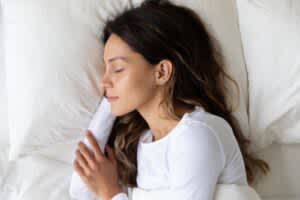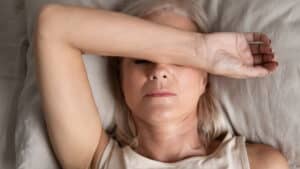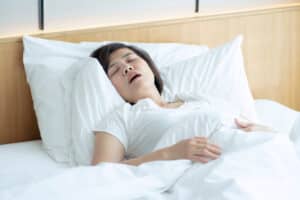Sleeping during your menstrual cycle can be uncomfortable. Hormonal changes, painful symptoms, and a general feeling of exhaustion can make sleep seem impossible. We discuss lifestyle changes to incorporate during your next cycle to help reduce symptoms and get better sleep.
How Does Your Period Affect Sleep?
Many people report lower sleep quality during and just before their period. Sleep problems throughout the month may be due to hormones as well as physical discomfort.
Changing Hormone Levels
Changing sleep quality throughout the month may arise in part from fluctuating levels of progesterone and estrogens. Different individuals have different levels of hormones, which may explain why sleep problems are not consistent from one person to the next.
A peak in progesterone levels about a week before your period causes a corresponding increase in body temperature, which may lead to fragmented sleep. Progesterone may also directly affect how much time you spend in different sleep stages. Birth control pills affect hormone levels and can also influence sleep quality.
Premenstrual Symptoms
In the week before their period, people may struggle to fall asleep and spend more time awake throughout the night. Sleep problems during these days may be exacerbated by symptoms of premenstrual syndrome (PMS), such as:
- Bloating
- Sore breasts
- Changes in mood
- Changes in bowel movements
- Light and noise sensitivity
- Headaches
- Fatigue
- Trouble sleeping or excessive sleepiness
Some people experience a more severe cluster of symptoms before their period, known as premenstrual dysphoric disorder (PMDD). PMDD is marked by extreme mood swings including severe depression, anger, panic attacks and anxiety. Individuals with PMDD report having a harder time falling and staying asleep due to problems regulating melatonin, the sleep hormone. Similarly, people with sleep problems are also more likely to have PMDD.
Physical Discomfort
Premenstrual symptoms and painful cramps during your period can contribute to poor sleep quality. In turn, sleep deprivation can affect the menstrual cycle and increase sensitivity to pain.
Studies have found that those with irregular menstrual cycles and those who bleed more heavily during their periods are more likely to experience fatigue and sleep problems. Irregular cycles are linked to light sleep and nighttime wakings, and a longer period may also be accompanied by insomnia symptoms.
Some people may experience vivid dreams and nighttime awakenings during their period. On a practical level, nighttime concerns about menstrual pads slipping out of place have been found to decrease the time spent in deep sleep.
Tips for Better Sleep While on Your Period
Finding what works for you during your period might take a few months. Exercise, calming techniques, and changing your thermostat might help you feel more comfortable and get more rest during your period.
Find a Comfortable Sleeping Position
Depending on what symptoms you are currently experiencing, you might need to shift your sleep position. For example, if you feel bloated, you may not feel comfortable sleeping on your stomach. If you have back cramps, try side sleeping with a pillow between your thighs or sleeping on your back with a thin pillow under your knees. You may also want to experiment with different types of pads, tampons, period underwear, or menstrual cups if leaking at night is a concern.
Lower the Thermostat
Research suggests that the optimal bedroom temperature is between 66 and 70 degrees Fahrenheit. However, changes in hormone levels in the body during menstruation can increase body temperature, so you may find you sleep more comfortably by setting your bedroom thermostat a few degrees cooler.
Consider Your Eating Habits
To reduce bloating, try to stay hydrated by drinking more water and reducing caffeine, salt, and sugar. It can also help to eat more frequently, in smaller amounts, and avoid certain foods that make your symptoms worse. A diet rich in whole grains, fruits, and vegetables can help reduce PMS symptoms.
Eating a large dinner may make it more difficult for your body to relax during sleep, so consider reducing portion sizes in the evening especially. Ask your healthcare provider about nutritional supplements that may help relieve symptoms.
Exercise Regularly
Regular exercise in general and higher-intensity exercise in the lead-up to your period can help reduce the severity of PMS symptoms. Good options include yoga, swimming, or other forms of aerobic exercise.
Maintaining a healthy weight is generally thought to reduce the risk of sleep problems during your period. Try taking a brisk walk around your neighborhood, particularly during the first three days of your period.
Try Different Relaxation Methods
Though more research is needed, some studies have found benefits of yoga, deep breathing, and meditation techniques for relieving period symptoms. Muscle relaxation and massage may also help manage symptoms. Promote relaxation before bedtime by turning on some calming music or choosing another soothing activity.
Reduce Smoking
Research suggests that smoking increases the risk of period-related sleep problems, including sleep efficiency and total sleep time.
Improve Your Sleep Hygiene
Changing certain sleep habits may help reduce period insomnia without the need for sleep medications. Health experts generally recommend keeping a regular bedtime, maintaining a cool, dark, and quiet bedroom, and avoiding blue light before bed to promote sleep.
If you are still experiencing sleep problems or excessive discomfort related to your period after making these lifestyle changes, talk to your doctor. They can work with you to explore the benefits and drawbacks of other treatment options, such as oral contraceptives to help regulate your cycle or cognitive behavioral therapy for insomnia (CBT-I) for sleep disruption.
References
Ask the Sleep Doctor
Have questions about sleep? Submit them here! We use your questions to help us decide topics for articles, videos, and newsletters. We try to answer as many questions as possible. You can also send us an email. Please note, we cannot provide specific medical advice, and always recommend you contact your doctor for any medical matters.


































